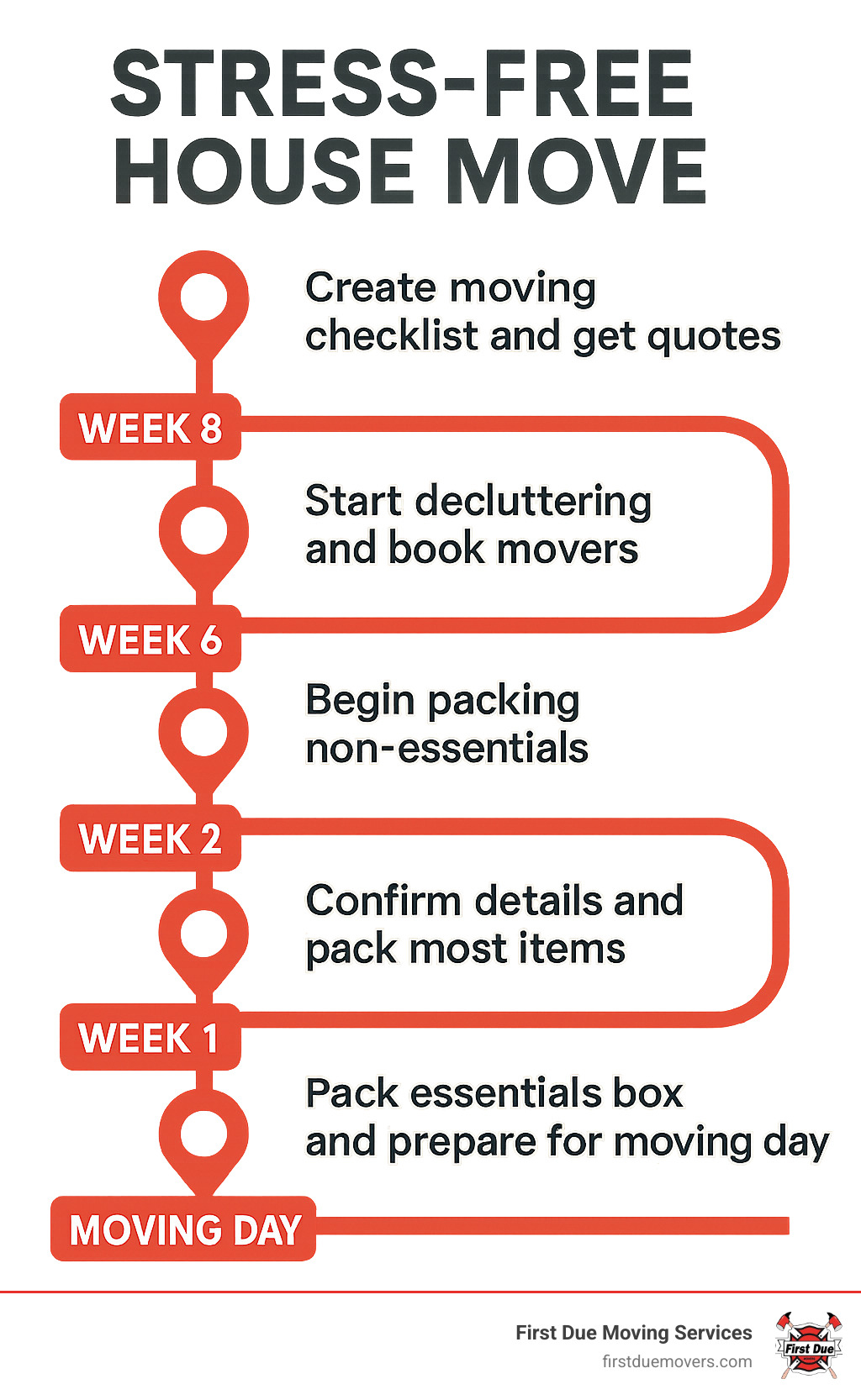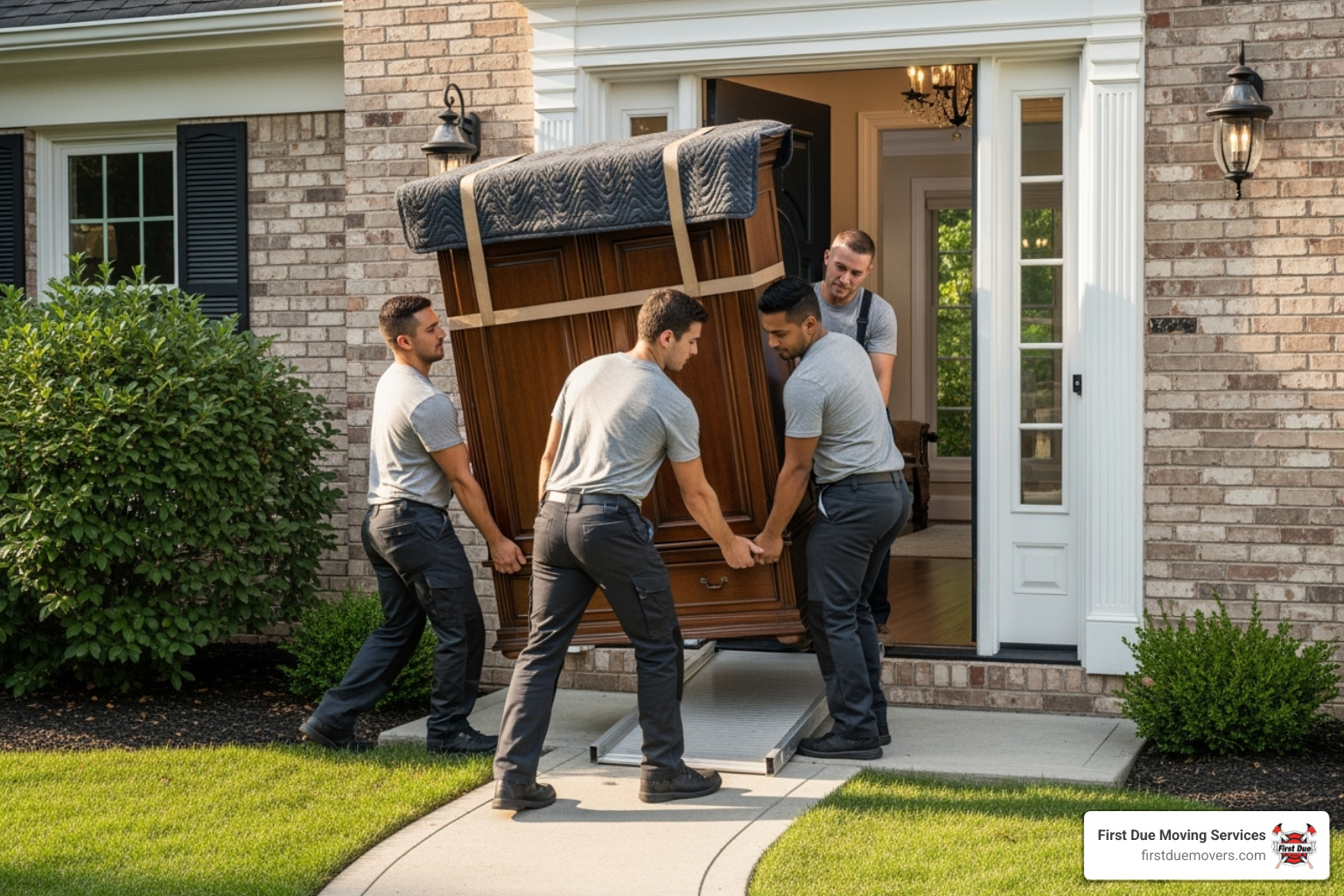Stress-Free House Move: 8-Week Ultimate Guide
Why Moving Is One of Life’s Most Stressful Events
A stress-free house move might sound like an oxymoron, but it’s achievable with the right approach. This guide will show you how to make your move smooth and manageable.
Key Elements of a Stress-Free Move:
- Start planning 8 weeks before your move date
- Declutter ruthlessly to reduce what you need to pack
- Create a detailed timeline and stick to it
- Pack an essentials box for your first night
- Consider hiring professional movers for heavy lifting
- Take care of your physical and mental health throughout
Many people find moving to be the most stressful event of their lives, involving hundreds of decisions, physical exhaustion, and the emotional weight of leaving a familiar home. But it doesn’t have to be that way.
The key to a smooth transition is preparation. When you start early and follow a proven system, moving transforms from a nightmare into a manageable process. This guide is your roadmap, walking you through the exact strategies that turn overwhelming moves into organized transitions, whether you’re moving across town or across the country.

The Foundation: Meticulous Planning and Preparation (8-4 Weeks Out)
A stress-free house move starts with giving yourself enough time. Starting your preparations eight weeks out is the key to moving with confidence and avoiding last-minute chaos.
Your first mission is to create a master moving checklist and timeline. List every task, from booking movers to arranging pet care, and assign specific due dates. This roadmap prevents last-minute oversights. At the same time, set a budget for all moving-related costs, including supplies, movers, and utility deposits. Keep all your contracts, quotes, and important numbers in a dedicated moving file (physical or digital) for easy access.
Thoughtful preparation is crucial because moving ranks as one of life’s top stressors. If you’re ready to explore professional help, you can learn more about Moving Quotes Redmond WA.
Decluttering: The Foundation of a Stress-Free House Move
Before packing, accept ruthless decluttering. Why pay to move items you don’t want or need? Every item you get rid of saves you time, money, and effort later.
Use the room-by-room method. Go through each space and sort items into three piles: keep, donate/sell, and toss. Consider a garage sale or online listings for valuable items to offset moving costs. Many charities offer pickup services for donations, and organizations like Move for Hunger make it easy to donate non-perishable food. For broken appliances and junk, a junk removal service can provide significant mental relief.
Gathering Your Arsenal: Moving Supplies and Budgeting
Once you’ve decluttered, gather quality moving supplies. Having the right tools prevents frustration and protects your belongings. You’ll need:
- Different box types: Small boxes for heavy items (books) and large boxes for light items (pillows).
- Quality packing tape and a dispenser.
- Permanent markers for clear labeling.
- Bubble wrap and packing paper for fragile items.
For more guidance, see our guide to Right Moving Supplies.
On the financial side, use budgeting tools to keep your finances on track. Remember to account for hidden costs like utility deposits and address change fees. Tracking expenses from day one with an app like EveryDollar prevents sticker shock and reduces financial stress. A realistic budget and the right supplies are investments in your peace of mind.
The Art of Smart Packing (4-1 Weeks Out)
Smart packing is the key to a stress-free house move. The secret is to work smarter, not harder, by starting early. Begin packing at least four weeks before moving day, focusing first on items you don’t use daily.
Adopt a room-by-room strategy, completing one room before starting the next to avoid feeling overwhelmed. Set up a packing station in each room with your supplies. Remember the golden rule: heavy items belong in small boxes (books, tools) to ensure they’re liftable. Use plenty of bubble wrap for fragile items and fill any empty spaces in boxes with packing paper to prevent shifting and breakage. Mark these boxes clearly as “FRAGILE.”
For detailed guidance on tackling each space efficiently, check out our comprehensive Room by Room Packing Strategy.
Creative Labeling and The “Open-First” Box
Strategic labeling is your secret weapon. Use a color-coding system by assigning a different colored sticker to each room, allowing movers to place boxes correctly without asking. For even better organization, number your boxes and keep a master list of the contents (e.g., Box 23: Kitchen – coffee mugs). Always label multiple sides of each box so they’re identifiable even when stacked.
The “open-first” box is your survival kit for the first night. Pack it with essential toiletries, bedding, phone chargers, daily medications, snacks, basic tools, and cleaning supplies. Keep this box with you or ensure it’s the last one on the truck and the first one off. If this sounds overwhelming, consider our Professional Packing Services.
Packing Specific Rooms and Valuables
Different rooms require different approaches.
- Kitchen: Pack plates vertically, wrap knives in dish towels, and use pots to hold smaller items. You can even wrap utensil trays in stretch wrap to keep them organized.
- Clothing: Use the garbage bag method for hanging clothes (pull bags over them on the hanger). Roll folded clothes to save space. Dresser drawers often don’t need to be fully emptied if secured.
- Electronics: Take photos of cord connections before unplugging them and label each cord.
- Valuables: Important documents (passports, birth certificates) and valuables (jewelry) should never be packed. Keep these items with you personally during the move.
For artwork and mirrors, specialized protection like picture boxes makes all the difference. Learn more at our Right Moving Supplies page.
Achieving a Stress-Free House Move: Execution and Well-being (Moving Week & Day)
With the planning and packing done, it’s time to execute your stress-free house move. During the final week, confirm all details with your moving company. Do a final walkthrough of your old home, checking every closet and cabinet to ensure nothing is left behind.
Prepare your new home by arranging for a deep clean before your belongings arrive. Crucially, ensure your utilities are connected and working in advance to avoid arriving to a dark, disconnected house. On moving day, arrange care for children and pets to keep them safe and reduce your stress. Stick to your checklist, take final meter readings, and keep important documents with you. For more strategies, see our guide on Streamlining Your Residential Move.
Hiring Professionals: The Ultimate Tip for a Stress-Free House Move

While DIY moving can seem cheaper, hiring professional movers is the best investment for a truly stress-free house move. Professionals bring speed, efficiency, and experience, accomplishing in hours what might take you a full weekend. They also provide the right equipment and lifting techniques to prevent injury and damage to your belongings.
Most importantly, reputable moving companies offer insurance options that protect your items. When choosing a company, verify they are licensed and insured. Get quotes from several companies, but focus on reputation and experience, not just the lowest price. Ask about their process and read reviews. For guidance on making the right choice, visit our resource on Choosing Reliable Local Movers.
Managing Your Physical and Mental Health
Moving is an emotional rollercoaster. It’s normal to feel anxious or sad, so acknowledging these feelings is the first step to managing them. This is a marathon, not a sprint; take regular breaks to avoid burnout.
Prioritize your well-being by eating healthy, staying hydrated, and protecting your sleep schedule. Even light physical activity like a short walk can work wonders for stress. Your mental health is just as important as getting the boxes packed correctly. Don’t be afraid to ask for help, whether it’s from friends or professionals. For more tips, see these Tips for managing stress and anxiety. At First Due Moving Services, we offer Expert Solutions for Stress-Free Relocation that support you through the entire transition.
Settling In: From House to Home (Post-Move)
You’ve made it through moving day, but a strategic approach to unpacking is key to finishing your stress-free house move. Don’t try to do everything at once; this is the final phase of your organized move.
Start with your essentials box. Make the beds, set up toiletries in the bathroom, and get the coffee maker going. These small wins create an immediate sense of comfort. Next, focus on the kitchen so you can prepare real meals and establish normalcy. Bedrooms should be your next priority, creating restful spaces to recharge.
To avoid burnout, pace yourself. Unpack for short, 20-minute intervals. As you empty each box, break it down immediately to keep your new home from looking like a warehouse. This simple habit keeps stress levels down. For helpful strategies specific to your area, check out our guide: More info about a Seamless Local Moves in Bellevue.
Making Your New Space and Community Feel Like Home
It can take six months to a year to feel truly settled, so be patient with yourself. Start by adding personal touches like photos and favorite blankets to make the space feel like yours. Take time to arrange furniture in a way that feels comfortable and functional.
Getting to know your new neighborhood is just as important. Explore local shops and parks, and take a moment to meet your neighbors. Establishing new routines, like a morning walk or coffee spot, helps create stability. While building new connections, stay connected with old friends and family for emotional support.
A cluttered space can increase stress, so maintaining order as you unpack will help your new house feel like a peaceful home. Be gentle with yourself; it’s normal to feel both excited and overwhelmed during this new chapter.
Frequently Asked Questions about Moving
Here are answers to the most common questions about planning a stress-free house move.
How far in advance should I start planning my move?
Start planning at least 8 weeks before your move date. This gives you ample time to declutter, research moving companies, gather supplies, and pack methodically without feeling rushed. Starting early is the best way to ensure better availability and pricing from movers.
What’s the most important thing to pack in an essentials box?
Your essentials box is your survival kit for the first 24 hours. It should contain toiletries (especially toilet paper), daily medications, phone chargers, basic kitchen supplies (paper plates, bottled water), and clean bedding for at least one bed.
Should I hire movers or move myself?
For a truly stress-free house move, hiring professional movers is almost always worth the investment. While a DIY move seems cheaper, hidden costs like truck rental, fuel, and time off work add up. More importantly, professionals bring experience, efficiency, and insurance protection. They can prevent costly damage to your belongings and save you from the physical strain and risk of injury, turning a chaotic experience into a smooth transition.
Conclusion
A stress-free house move is achievable when you approach it with the right strategies. The secret ingredients are simple: start early with meticulous planning, be ruthless when decluttering, pack systematically, and take care of yourself throughout the process. This roadmap transforms a potentially chaotic experience into an organized, manageable transition.
Moving is more than getting your stuff from point A to point B; it’s about embracing a fresh start. Solid preparation allows you to focus on the excitement of a new beginning rather than the stress of logistics.
At First Due Moving Services, we understand that trust and reliability are paramount. As a company founded by firefighters, we bring the values of integrity, professionalism, and service to every move we handle. We’re here to shoulder the heavy lifting—literally and figuratively—so you can focus on what matters most.
Ready to make your move a success story? Contact us for expert logistics services in Seattle, WA and let’s turn your upcoming move into something you can actually look forward to.



